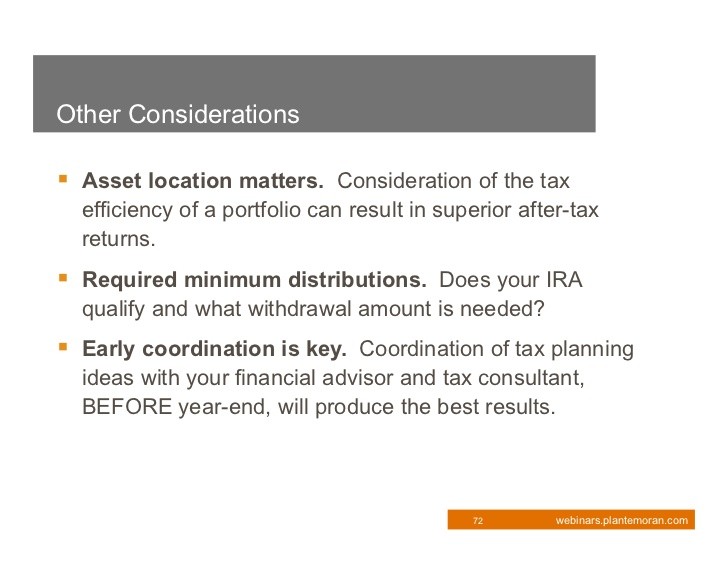Asset Location Your Guide to TaxEfficiency
Post on: 21 Июнь, 2015 No Comment

Recent Posts:
Asset Location: Your Guide to Tax-Efficiency
We investors often focus so heavily on investment types and asset allocation that we overlook asset location. a key aspect of tax efficiency and thus higher net returns.
The main idea of asset location is just as it sounds: When possible, you hold certain investment types in the ideal account type (location) to minimize taxes. For example, many investors have two basic types of investment accounts:
- A regular brokerage account that can either be individual or joint.
- A tax-deferred account, such as an IRA or 401(k).
But how many of these same investors have ever given any thought as to what investment types are best to place in these accounts?
Failing to implement proper asset location may be one of most overlooked and among the most damaging portfolio management mistakes investors make.
Revisiting the Basics of Investment Taxation
Tax efficiency is a measure of how much of an investments return remains after taxes are paid. Put simply (and all other things being equal), the greater the tax efficiency, the higher the net return after taxes. The opposite is true, too: Tax inefficiency is a drag on performance.
Remember: Investments held in a brokerage account are taxed on capital gains and on dividends. You only incur capital gains taxes when you sell shares of an investment at a higher price than you bought it and you pay taxes on dividends when the investments you hold generate dividends.
Tax-deferred accounts generally do not generate taxes of any kind unless and until money is withdrawn from the account, at which time the investor will pay income tax at their top marginal rate. Early withdrawal penalties may also apply.
Also remember that tax brackets matter! The higher the marginal bracket rate, the more important tax-efficiency becomes with investment planning. An investor in a 39.6% tax bracket receives more benefit from tax efficiency on a relative basis than an investor in a 15% bracket (keeping in mind that long-term capital gains and qualified dividends are currently taxed at 15%).
So far, so good, right?
But even the most brilliant investors and money managers can get the basics wrong.

Getting the Asset Location Right
As a general rule of thumb, tax-efficient investments should be held in your taxable account(s), and investments that are not tax-efficient should be held in your tax-deferred account(s).
Here are examples of tax-efficient investments, to be ideally held in taxable accounts:
- Growth stocks and growth stock mutual funds: They generally pay little or no dividends.
- Municipal bonds, municipal bond funds, and municipal money market funds: They are exempt from federal taxes.
- Low-yield bond funds: The lower yields result in lower taxes.
Here are examples of tax-inefficient investments, to be ideally held in tax-deferred accounts:
- Value stock mutual funds: They generally pay more dividends, especially in the large-cap style.
- Dividend-paying stocks and dividend funds: Again, keep dividend-paying investments in a location where you wont get taxed (for now).
- Junk bonds and high-yield bond funds: Higher yields dont matter in a tax-deferred account.
Hopefully your investing and accountant minds have merged together to form the logical connection: Investments that generate little to no taxes should be held in brokerage accounts and investment types that tend to generate taxes should be held in tax-deferred accounts.
You also can be mindful of your own behavior and intentions. For example, if you trade frequently and have holding periods of less than one year, your gains will be short-term, which are taxed as ordinarily income rates, ranging from 10% to 39.6% in 2014.
Got asset location? Now you do!
Kent Thune is not a tax professional and the information in this article is provided for discussion purposes only, and should not be misconstrued as investment advice. Under no circumstances does this information represent a recommendation to buy or sell securities.














